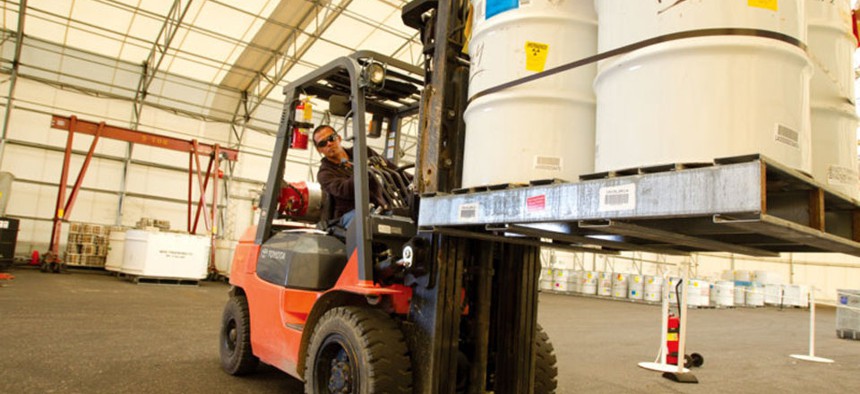Earthquake Could Cause Los Alamos Plutonium Facility to Collapse

A worker stages drums of transuranic waste at Los Alamos National Laboratory's Technical Area 54. Los Alamos National Laboratory
Collapse could result in release of deadly radiation, Energy IG says.
An earthquake could collapse the building at Los Alamos National Laboratory, N.M., where plutonium cores of nuclear bombs are produced, releasing deadly doses of radiation, the Department of Energy’s inspector general reported on Thursday
The IG also said systems designed to suppress fires in structures that store 5,600 containers of nuclear waste suffered from numerous pipe breaks and freeze damage. Forest fires in 2000 and 2011 resulted in evacuation of the lab and the city of Los Alamos.
The National Nuclear Security Administration, which manages the lab, dismissed earthquake concerns. “There is a rare probability of a seismic event occurring in Los Alamos of sufficient magnitude to cause a significant plutonium release from PF-4,” NNSA said, referring to the plutonium facility.
Greg Mello, director of the Albuquerque-based watchdog Los Alamos Study Group, said NNSA downplayed earthquake risks.
Built in 1978, the plutonium bomb core facility “lacks the structural resilience and redundancy required by modern building codes,” the report said, a deficiency that “makes it susceptible to structural failure if subjected to the strong seismic ground motions.”
Structural upgrades would take several years to complete. Until then, the IG said, “the potential for very high offsite dose consequences remains.”
Mello said that in plain English this means the 7,000 residents of White Rock, seven miles downwind of the lab, could be exposed to “high levels of plutonium, which could kill them.”
Mello said the IG and lab management additionally need to examine two nearby lab facilities that he said could also collapse in an earthquake. The Chemistry and Metallurgy Research facility, constructed between 1949 and 1952 and designed to house plutonium and uranium research, and the Sigma Complex for uranium research, are both vulnerable, he said.
Los Alamos stores its 5,600 containers of nuclear waste in dome-like structures made of fabric that “has exceeded its expected in-service life of 15-20 years,” the IG report said. “Its fire retardant properties are likely diminished but unknown.”
The IG said eleven of these domes “lacked remotely monitored automatic fire suppression systems.” Los Alamos plans to ship all of the waste containers for storage at the Waste Isolation Pilot Plant, Carlsbad, N.M., by next year.
The IG recommended Los Alamos complete structural upgrades to the plutonium bomb core plant and remove all the waste containers on schedule. Cynthia Lersten, Energy associate administrator for management and budget, said the upgrades will be completed within two to three years and the containers would all be shipped out by Dec. 31, 2014.
NEXT STORY: Is DOD foot-dragging on spectrum sharing?






